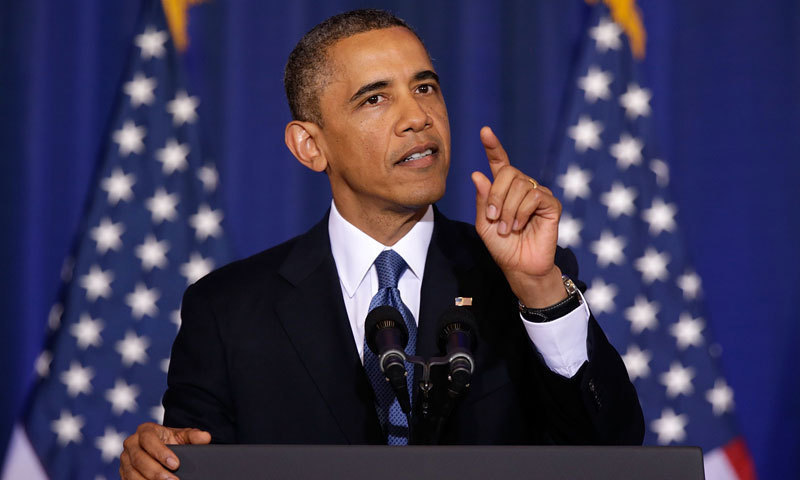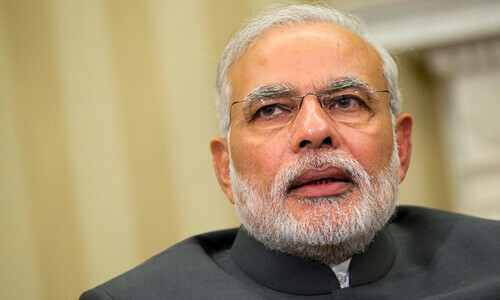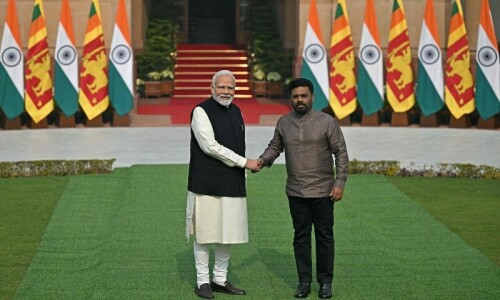Hostility towards Pakistan quickest route to national unity in India, says Obama

WASHINGTON: The quickest route to national unity in India is “expressing hostility toward Pakistan,” says Barack Obama, America’s first coloured president in his new book, “A Promised Land.”
The book, released worldwide on Nov 17, also includes a pen portrait of former Indian prime minister, Manmohan Singh, whom he first met at the 2009 G20 summit in Pittsburgh.
When Obama met Singh again during his visit to India in November 2010, Singh told him that he feared “rising anti-Muslim sentiment had strengthened the influence of Hindu nationalist BJP”, the main opposition party at the time.
Obama described Singh as “a gentle, soft-spoken economist” who engineered the modernisation of his nation’s economy.
Obama quoted Singh as saying that the “call of religious and ethnic solidarity can be intoxicating” for politicians, particularly in a country like India, which was still racked by poverty, wealth inequality, violence and ultra-nationalism.
Obama noted that “many Indians (took) great pride in the knowledge that their country had developed a nuclear weapons programme to match Pakistan’s, untroubled by the fact that a single miscalculation by either side could risk regional annihilation.”
“Violence, both public and private, remained an all-too-pervasive part of Indian life. Expressing hostility towards Pakistan was still the quickest route to national unity,” Obama wrote.
“Most of all, India’s politics still revolved around religion, clan, and caste.”
But Obama also acknowledged that “in many respects, modern-day India counted as a success story, having survived repeated changeovers in government, bitter feuds within political parties, various armed separatist movements, and all manner of corruption scandals”.
But “despite its genuine economic progress, … India remained a chaotic and impoverished place: largely divided by religion and caste, captive to the whims of corrupt local officials and power brokers, hamstrung by a parochial bureaucracy that was resistant to change,” he added.
“A Promised Land” ends with the US raid on the Bin Laden compound in 2011 and, therefore, does not include the current Indian prime minister, Narendra Modi.
Read: Breaking news of Osama raid to Pakistan was easier than thought, says Obama
Commenting on the prevalence of violence in India, Obama wondered if “violence, greed, corruption, nationalism, racism, and religious intolerance” were “too strong for any democracy to permanently contain”.
The former US leader noted that those who believed in violence “seemed to lie in wait everywhere, ready to resurface whenever growth rates stalled or demographics changed or a charismatic leader chose to ride the wave of people’s fears and resentments”.
Obama also praised Singh’s ascent to prime minister’s office, noting that he was from an “often persecuted Sikh religious minority.”
He claimed that “more than one political observer” told him that Sonia Gandhi had “chosen Singh precisely because as an elderly Sikh with no national political base, he posed no threat to her 40-year-old son, Rahul, whom she was grooming to take over the Congress Party.”
“Somehow, I was doubtful” if Rahul Gandhi was capable of “preserving the Congress Party’s dominance over the divisive nationalism touted by the BJP,” he wrote.
Obama described Rahul Gandhi as “smart and earnest,” with good looks” but noted that “there was a nervous, unformed quality about him, as if he were a student who’d done the coursework and was eager to impress the teacher but deep down lacked either the aptitude or the passion to master the subject.”
Obama wrote that India had “always held a special place in my imagination.” Analysing this fascination, he said: “Maybe it was its sheer size, with one-sixth of the world’s population, an estimated two thousand distinct ethnic groups, and more than seven hundred languages spoken.”
But “more than anything, though, my fascination with India had to do with Mahatma Gandhi. Along with Lincoln, King, and Mandela, Gandhi had profoundly influenced my thinking,” he added.
Obama mentioned that his Indian and Pakistani college friends, who “taught me to cook dahl and keema and turned me on to Bollywood movies” also stirred his interest in India.
But this, he wrote, could not hide the huge issues India faced as the world’s second most populated country.
“Across the country, millions continued to live in squalor, trapped in sunbaked villages or labyrinthine slums, even as the titans of Indian industry enjoyed lifestyles that the rajas and moguls of old would have envied,” he writes in his new memoir.
“Violence, both public and private, remained an all-too-pervasive part of Indian life.”
Published in Dawn, November 19th, 2020













































